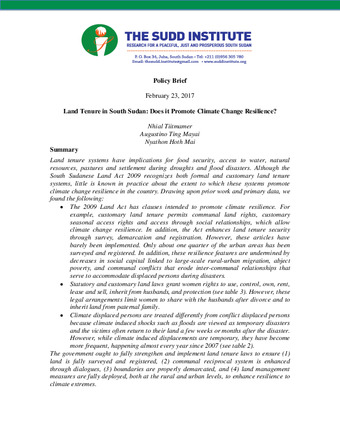Land Tenure in South Sudan: Does it Promote Climate Change Resilience?

Authors: Nyathon Hoth Mai, Nhial Tiitmamer, Augustino Ting Mayai
Organization: The Sudd Institute
Type: Policy Briefs
Date: 01/03/2017
Publication Summary
Land tenure systems have implications for food security, access to water, natural resources, pastures and settlement during droughts and flood disasters. Although the South Sudanese Land Act 2009 recognizes both formal and customary land tenure systems, little is known in practice about the extent to which these systems promote climate change resilience in the country. Drawing upon prior work and primary data, we found the following:
- The 2009 Land Act has clauses intended to promote climate resilience. For example, customary land tenure permits communal land rights, customary seasonal access rights and access through social relationships, which allow climate change resilience. In addition, the Act enhances land tenure security through survey, demarcation, and registration. However, these articles have barely been implemented. Only about one-quarter of the urban areas has been surveyed and registered. In addition, these resilience features are undermined by decreases in social capital linked to large-scale rural-urban migration, abject poverty, and communal conflicts that erode inter-communal relationships that serve to accommodate displaced persons during disasters.
- Statutory and customary land laws grant women rights to use, control, own, rent, lease and sell, inherit from husbands, and protection (see table 3). However, these legal arrangements limit women to share with the husbands after divorce and to inherit land from paternal family.
- Climate displaced persons are treated differently from conflict-displaced persons because climate-induced shocks such as floods are viewed as temporary disasters and the victims often return to their land a few weeks or months after the disaster. However, while climate-induced displacements are temporary, they have become more frequent, happening almost every year since 2007 (see table 2).
The government ought to fully strengthen and implement land tenure laws to ensure (1) land is fully surveyed and registered, (2) communal reciprocal system is enhanced through dialogues, (3) boundaries are properly demarcated, and (4) land management measures are fully deployed, both at the rural and urban levels, to enhance resilience to climate extremes.
Nyathon Hoth Mai is Environment and Natural Resources Program Officer at the Sudd Institute. Before joining the Institute full time, Nyathon worked as Research Associate between Oct 2015 and Jan 2019. She has a BSc in Geology from the Federation University, Australia, and an MSc in Global Energy and Climate Policy from the School of Oriental and African Studies (SOAS), University of London. She is also an independent Researcher and policy analyst. Her research interest areas include Geology, climate change and energy policy, and issues affecting South Sudanese women. In addition, Nyathon was the Co-founder and Managing Director of My Referendum for Freedom (MRF) that actively engaged the South Sudanese youth from all over South Sudan and diaspora as a vehicle for civic education to the rest of the populace during the South Sudan Referendum. She also devoted much of her time to South Sudan community development in Australia.
Nhial Tiitmamer has served as the Director of the Environment and Natural Resources Program at The Sudd Institute where he is currently on leave to work with United Nations in South Sudan (UNMISS). He has served as an Adjunct Assistant Professor at the University of Juba where he has taught Environmental Economics, Natural Resources Economics and Environmental Sociology. Between November 2021 and November 2022, Nhial worked as Senior Environment Associate with the United Nations High Commissioner for Refugees (UNHCR) in Juba. Before returning from Canada in 2013, Nhial worked at Arletta Environmental Consulting in Calgary and at University of Alberta’s Augustana Campus in Camrose in Alberta, Canada. Nhial’s research focusses on natural resources governance, environmental protection, climate change, and sustainable energy. He was awarded in May 2023 by the Board of Directors of The Sudd Institute with Research Impact Award for policy impacts. Nhial holds a B.A. in Environmental Studies with a minor in English Literature from the University of Alberta and an M.Sc. in Sustainable Energy Development from the University of Calgary in Alberta, Canada.
Augustino Ting Mayai's Biography
Augustino Ting Mayai is the former Managing Director of the Sudd Institute. He is a founding Research Director of the same institution, serving in this capacity for a decade. He holds a Ph.D. in Sociology, with concentrations on demography and development from the University of Wisconsin-Madison. He currently studies how state effectiveness affects child health outcomes in South Sudan and Ethiopia. Dr. Mayai has written extensively on South Sudan’s current affairs. August is the current Chair (Statistician General) of the National Bureau of Statistics, Government of South Sudan.
